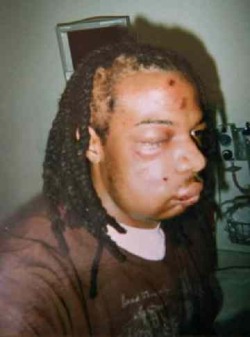No Justice. Just White Supremacy. White Jury Rules in Favor of Pittsburgh Police who Beat Unarmed Black Student
/ From [HERE] and [HERE] An eight-member federal jury decided in favor of three white Pittsburgh police officers on Jordan Miles' accusation of malicious prosecution and a judge ordered a mistrial on two other counts, ending a three-week civil trial but setting up an as-yet-unscheduled retrial on whether the officers falsely arrested the young Homewood man and used excessive force.
From [HERE] and [HERE] An eight-member federal jury decided in favor of three white Pittsburgh police officers on Jordan Miles' accusation of malicious prosecution and a judge ordered a mistrial on two other counts, ending a three-week civil trial but setting up an as-yet-unscheduled retrial on whether the officers falsely arrested the young Homewood man and used excessive force.
The jury was composed of 7 whites and one black man. It means the jury could not award damages to Jordan Miles who maintains he was stopped without cause - likely because he was a young black man walking in his high-crime neighborhood - then wrongly arrested and beaten before and after he was handcuffed on a frigid, snowy night.
"It's a good win for us," said James Wymard, the attorney for Officer David Sisak who wasn't in the courtroom because he's vacationing with his family. "We said all along once this case was exposed to the light of daylight these allegations would not stand," said Robert Leight, attorney for another defendant, Officer Richard Ewing.
Jurors seen leaving the courthouse would not speak to reporters. Miles, now 20, his mother and sister declined comment, but his attorneys promised to continue the legal battle. "There will be a new trial on the most important issue: Was there excessive force?" said Tim O'Brien, one of Miles' attorneys.
Jordan claimed undercover officers approached him without articulable suspicion. Officers chased him when he ran and when they caught up with him they beat him into submission by delivering violent blows that left his face swollen and distorted. Police also used a stun gun and pulled out a chunk of his hair. The officers put him in handcuffs, and repeatedly shoved his face into the snow, causing a piece of wood to impale his gums. He is 5-foot-6 and 150 pounds and was unarmed. No weapons were found. He suffers from permanent brain damage. [MORE]
Ewing said only that the officers "weren't allowed" to comment as he and Officer Michael Saldutte, the third defendant, walked briskly from the courtroom.
The officers had always maintained they did nothing wrong and that they stopped Miles only because he appeared to be lurking near a neighbor's home and had a bulge in his coat pocket which they took for a gun before finding only a soda bottle about 11 p.m. on Jan. 12, 2010. Miles has denied having even the bottle. He said he was merely walking about a block to his grandmother's house, where he routinely spent the night, when the plainclothes officers rolled up to him asking for money, drugs and a gun - a tactic the police denied using, but which Miles' attorneys said is used to put suspected drug dealers on the defensive.
Miles, then an 18-year-old senior at Pittsburgh's performing arts high school with no criminal record, was charged with assaulting police, loitering and prowling at night, resisting arrest and escape. Miles said he ran away and struggled with police only, but only because they didn't identify themselves as police and he feared being robbed.
Saldutte's veteran police union lawyer, Bryan Campbell, said the verdict shows the jury believed the officers. "The jury had to decide which story they wanted to believe," Campbell said.
In a criminal or a civil case determined to be baseless, the defendant or respondent can choose to file a claim of malicious prosecution against those who took active part in the original case.
In his lawsuit, Mr. Miles accused officers Ewing, Saldutte and Sisak of beating, falsely arresting and maliciously prosecuting him.
Also to be retried is Miles' claim that police used excessive force - choking him and hitting him in the head with a hard object after he was handcuffed, among other alleged abuse - that left him with post-traumatic stress disorder and short-term memory problems that will keep him from completing a college education and realizing his full personal and earning potential.
A district justice dismissed the criminal charges against Miles two months later when the woman who lived in the house where police contend they saw Miles lurking testified she never told police she didn't know who he was and was never asked, as officers claimed in a criminal complaint, whether he had permission to be there.
O'Brien said he's hopeful a new jury will see the case differently - especially if the judge can be persuaded to allow some evidence in the retrial which was barred from this trial, including a police commander's testimony that Saldutte and Ewing had made up claims to support similar arrests in the past.
Mr. Miles' attorney, J. Kerrington Lewis, said his client "believes in this case. ... We're going to go back at it."
Mr. Miles' other attorney, Timothy O'Brien, said there are evidentiary issues that may be decided differently the second time around, which he felt could favor the plaintiff.





































































































































































































































































